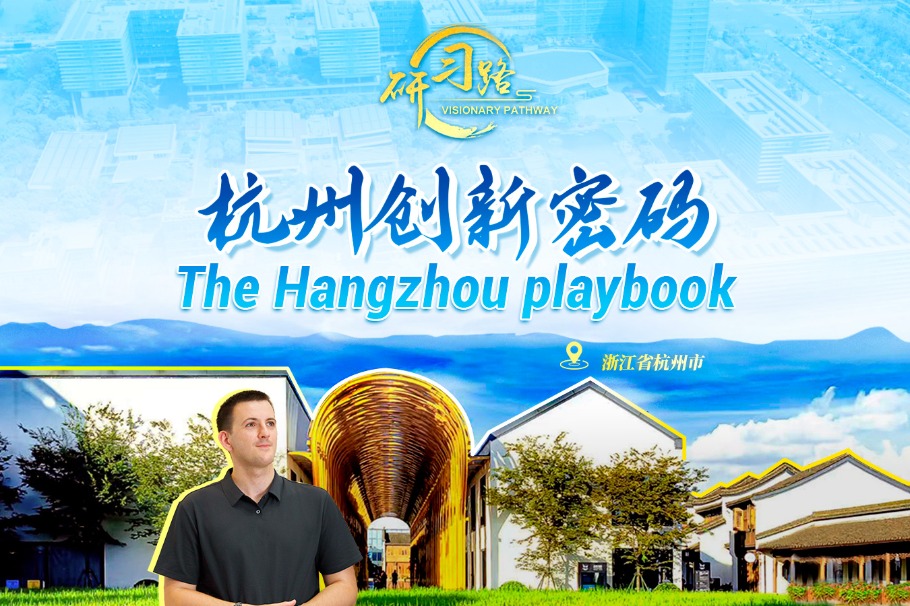China's ecological push in focus as UNESCO biosphere program outlines future roadmap
* The 5th World Congress of Biosphere Reserves, held in Hangzhou, capital of East China's Zhejiang province, marked the first time the meeting was convened in Asia.
* The congress produced two landmark outcome documents: the Hangzhou Strategic Action Plan for UNESCO's MAB Programme and its World Network of Biosphere Reserves (2026-2035), and the Hangzhou Declaration.
* China has remained a key participant in global ecological conservation, relentlessly exploring innovative approaches to biodiversity protection and ecosystem management.
Two landmark outcome documents were adopted at the 5th World Congress of Biosphere Reserves, charting the course for the UNESCO Man and the Biosphere (MAB) Programme over the next decade.
The congress, held in Hangzhou, capital of East China's Zhejiang province, from Sept. 22 to 25, marked the first time the meeting was convened in Asia. Every 10 years or so, UNESCO hosts the event to shape the future of biosphere reserves worldwide.
During the conference, some 4,000 delegates from over 150 countries and regions gathered under the theme "Shaping a Sustainable Future for People and Nature" to explore strategies for protecting biosphere reserves and advancing sustainable development.
China formally joined the MAB Programme in 1973 and established a national committee for the program five years later. To date, 34 nature reserves in China have been designated as UNESCO biosphere reserves, placing the country first in Asia in terms of total number of such reserves.
STRATEGIC ROADMAP
The congress produced two landmark outcome documents: the Hangzhou Strategic Action Plan for UNESCO's MAB Programme and its World Network of Biosphere Reserves (2026-35), and the Hangzhou Declaration.
"Together, these offer a clear roadmap for strengthening the MAB Programme worldwide and reaffirm biosphere reserves as learning sites for sustainable development," said Antonio Abreu, secretary of UNESCO's MAB Programme.
The Hangzhou Strategic Action Plan is a practical document that provides philosophy and vision, and promotes concrete actions. These specific actions will strengthen the World Network of Biosphere Reserves as learning laboratories for sustainability, he said.
Among the priorities are enhancing biodiversity conservation and ecosystem restoration; strengthening climate change mitigation and adaptation strategies; empowering local communities through green livelihoods and equitable benefit sharing; expanding education and research opportunities within biosphere reserves, and improving governance, monitoring and international cooperation across the modern network, Abreu said.
The Hangzhou Declaration encourages all UNESCO member states to establish MAB National Committees and set up biosphere reserves, particularly in key biodiversity areas, transboundary regions and marine environments.
It encourages UNESCO member states to strengthen the application of advanced technologies and digital tools, such as artificial intelligence (AI), to develop a robust monitoring, open-access database, evaluation and learning framework.
He Hongping, vice president of the Chinese Academy of Sciences (CAS), pledged that China, as the host country, will translate the Hangzhou Strategic Action Plan into concrete actions. China will share its insights on ecological civilization and advance tangible cooperation with international partners, dedicating its unique strengths and wisdom to the global community of life.
UNESCO officials urged to enhance global solidarity and cooperation to tackle global challenges through concrete actions and advance ecological conservation alongside economic and social development.
Audrey Azoulay, UNESCO director-general, spoke highly of China's achievements in ecological and environmental protection, as well as its contributions to global environmental governance.
Participants also lauded the ecological harmony in Hangzhou, an epitome of how China balances economic development with ecological and environmental protection.
"It is inspiring to see nature connected with the skyscrapers and other highly developed buildings here," said Olesya Sapozhnikova, lead consultant of the International Organizations Division at the Ministry of Natural Resources and Environment of the Russian Federation. "There is a lot of experience we could learn from China."
CHINA EXPERIENCE, TECHNOLOGIES
China drew huge attention at the event as many sub-forums focused on the country's experience in ecological and biodiversity protection.
China has remained a key participant in global ecological conservation, relentlessly exploring innovative approaches to biodiversity protection and ecosystem management.
Technologies such as big data, remote sensing and AI can be integrated into a cohesive technological framework. This synthesis enables more effective support for protecting sustainable livelihoods and ecosystems, said Guo Huadong, a CAS academician and director of the International Centre on Space Technologies for Natural and Cultural Heritage under the auspices of UNESCO.
Nature reserves and parks across the country have been using a wide range of technologies to protect the ecosystems and biodiversity.
In Inner Mongolia Autonomous Region in northern China, the Xilingol Grassland National Nature Reserve has developed a smart monitoring platform that integrates data from satellites, drones, ground sensors and subsoil monitoring.
In Wuhan, central China's Hubei Province, scientists have developed passive acoustic monitoring devices that capture real-time underwater signals to track the endangered Yangtze finless porpoise.
At Cuihu Park in Kunming, Southwest China's Yunnan province, researchers installed high-definition, 360-degree rotatable cameras that monitor bird activity around the clock.
Currently, a new round of technological revolution and industrial transformation is accelerating, driven by rapid breakthroughs in fields like AI and biotechnology, offering favorable conditions for jointly addressing global ecological challenges, said Hou Jianguo, president of the CAS.
Many participants believe they could draw from China's experience by using new technologies for ecological protection.
China is so much ahead as the country patrols its reserves with drones and live trackers, said Ann Frida Nandutu, monitoring and evaluation consultant of the World Bank and UN. "I have learnt a lot from this gathering because there is a lot to take back to Africa, especially my country, Uganda."
Gabriela Martinez, individual specialist, Natural Sciences Sector at UNESCO Ecuador Office, said he has noticed how powerful and useful AI is in ecological conservation in China. "We should have this futuristic view to live together in harmony with nature," he told Xinhua.
UNESCO launched the MAB Programme in 1971 to promote the sustainable management of biodiversity and human-nature interactions. It operates through the World Network of Biosphere Reserves, which includes 759 biosphere reserves across 136 countries.
-
4th Global Digital Trade Expo kicks off in Hangzhou
September 25, 2025
-
Chinese vice premier calls for joint efforts to strengthen biosphere reserve construction
September 23, 2025
-
Hangzhou to welcome global experts on ecology
September 17, 2025
-
Visionary Pathway - Hangzhou Playbook
July 15, 2025



